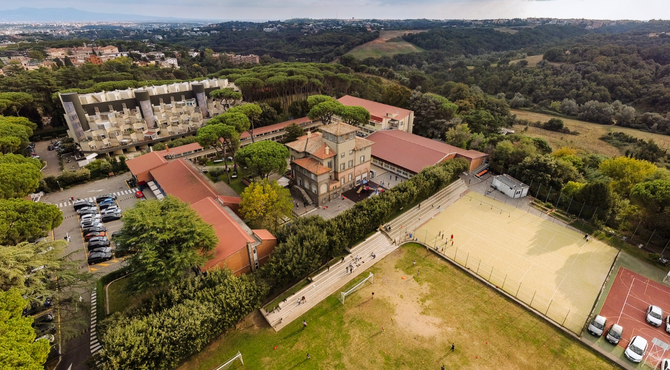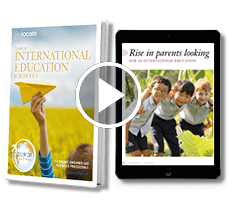Education in Italy
We explore the basics of the Italian education system, with a focus on two leading international schools in the country's capital city Rome.
- Kindergarten (scuola dell'infanzia)
- First Cycle (scuola primaria and scuola secundario di primo grado)
- Second Cycle (liceo, the Italian equivalent to high school, istituto tecnico/professionale, or istruzione e formazione professionale).
State schools
Maddalena Michieli, managing director of international relocation company Professional Relo says, “The education system in Italy is based on the principle that the State has exclusive legislative authority on general issues regarding education, such as minimum standards to be guaranteed throughout the country and the fundamental principles each region should comply with.“Regions share their legislative authority with the State on all educational issues except for vocational education and training for which they have exclusive legislative competence.Schools are autonomous concerning didactic, organisational, research and developmental activities.” The children of EU citizens are entitled to attend school in any EU country under the same conditions as nationals of that country. Michieli explains, “They have the right to be placed in a class with their own age group, at the equivalent level to their class in your country of origin – regardless of their language level. If you are an EU national migrating to another EU country for work, your children are entitled under EU law to receive free language tuition in your new home country to help them adapt to the school system there.”
The children of EU citizens are entitled to attend school in any EU country under the same conditions as nationals of that country. Michieli explains, “They have the right to be placed in a class with their own age group, at the equivalent level to their class in your country of origin – regardless of their language level. If you are an EU national migrating to another EU country for work, your children are entitled under EU law to receive free language tuition in your new home country to help them adapt to the school system there.”International schools
International schools welcome children of many different nationalities and are a good option for expats and families on assignment in Italy, with many offering globally-recognised curriculums and qualifications, bilingual teaching and education systems from different countries. For example, there are several British, American, Canadian, French, German and Japanese schools located in Italy. We find out more about two international schools that are based in Rome.American Overseas School of Rome
The American Overseas School of Rome has been a school for international families since 1947. AOSR is Rome’s oldest American-International School in Rome and one of Italy’s most prestigious International Schools for over 75 years. It is located in northern Rome on a 6-acre campus, surrounded by protected parkland, approximately 11km and just 25 minutes from the historic centre. As a non-denominational, co-educational day school the American Overseas School of Rome offers an English- language Pre-K through 12th Grade curriculum culminating in the IB, AP, and the American High School Diplomas.AOSR offers the best of an American-International education and aspires to inspire their diverse student body to courageously meet the demands of a changing world prioritizing rigor, high standards for learning, critical thinking, and an individualized approach to achievement. Students at AOSR benefit from the internationalism of our community, with over 50 nationalities represented.St George's British International School
Mr David Tongue, principal, St George's British International School, Rome, says, “At St George’s we are proud of our rich history of providing a world-class education to both expatriate and internationally-minded local families in one of the world’s most iconic cities. Our community - uniquely in Rome - represents more than 80 different nationalities and this infuses our school with vibrancy, inclusivity, tolerance, respect and support.“Our close links with the world’s highest-performing and most aspirational universities ensure Georgians are filled with ambition and have the highest possible expectations for their future. Whilst our IGCSE and IB results are among the best of any school of its type in the world, and are comparable with leading independent schools in the UK, we believe that a truly outstanding education is about so much more than just examination results.“Our focus on the nine Cs (academic competency, contentment, curiosity, confidence, the willingness to embrace challenge, commitment, creativity, compassion and cultural understanding) ensures our pupils become highly successful individuals who are equipped to excel whatever the global economy of the future looks like, but who are also proud of who they are and their own unique combination of qualities, talents, passions and challenges.“Our rich programme of extra-curricular activities allows pupils to develop a wide range of interests beyond the curriculum. Our sports facilities are without parallel in the city. Our performing arts and music productions are breathtaking in both their ambition and scope.”Marymount International School
Ms Sarah Gallagher, headmistress, Marymount International School Rome, says, “Founded by the Religious of the Sacred Heart of Mary (RSHM), Marymount International is located just a 20-minute drive from the city centre. Our beautiful campus is situated on 40 acres of protected parkland - the perfect setting for students to pursue a full range of academic, artistic, musical, sports and extracurricular activities.“The learning environment is supported by the latest technology, including Italy’s first Fabrication Laboratory in a private school. This space is designed for our 21st-century digital natives and is built on the work of Professor Seymour Papert and his colleagues at MIT. Our programme of studies is based on an international and American curriculum, culminating in the IB Diploma, which has been offered by Marymount for over 30 years.“As a Catholic school focused on the full development of the human person, Marymount’s mission is to welcome students of diverse cultural and religious backgrounds, seeking to guide them toward their full potential by striving to prepare them both academically and spiritually to be lifelong learners and tomorrow’s leaders, as well as to respond generously to the needs of our world and promote justice and dignity for all.”Starting a new school in Italy
The Italian school year usually runs from September until mid-June. Enrolment at compulsory schools can be done at any moment during the academic year of the arrival of minors in Italy. Typically, international schools are used to accommodating relocating families joining the school throughout the year and will know how to support your application quickly and efficiently.Michieli adds, “To help acclimate children into a new school, parents meet with the teachers of their child’s section who provide all the information regarding school attendance, school supplies, and especially the manner in which their child will be welcomed into the classroom.“Parents will be asked to provide a presentation of their family in order to present their child to the school. This document will be given to the teachers and will represent the basis for the personal relationship that the family will hold with them, before the child starts school.”This article is from Relocate Global's Guide to International Education & Schools 2019/20 which is packed with expert tips and information for those relocating and the professionals supporting them. For volume options, co-branded editions, digital or online licence agreements and advertising opportunities, contact Fiona Murchie at +44 (0)1892 891334 or email fiona@relocatemagazine.comNow available as an ebook on Amazon! Simply download from Amazon onto your Kindle, mobile phone or tablet to read wherever you are!
Subscribe to Relocate Extra, our monthly newsletter, to get all the latest international assignments and global mobility news.Relocate’s new Global Mobility Toolkit provides free information, practical advice and support for HR, global mobility managers and global teams operating overseas.
 Access hundreds of global services and suppliers in our Online Directory
Access hundreds of global services and suppliers in our Online Directory For more education and school-related news, visit our Education and Schools pages.© 2019. This article first appeared in the 2019/20 edition of the Guide to International Education & Schools published by Relocate Global, Spray Hill, Hastings Road, Lamberhurst, Kent TN3 8JB. All rights reserved. This publication (or any part thereof) may not be reproduced in any form without the prior written permission of Relocate Global. Relocate Global accepts no liability for the accuracy of the contents or any opinions expressed herein.
For more education and school-related news, visit our Education and Schools pages.© 2019. This article first appeared in the 2019/20 edition of the Guide to International Education & Schools published by Relocate Global, Spray Hill, Hastings Road, Lamberhurst, Kent TN3 8JB. All rights reserved. This publication (or any part thereof) may not be reproduced in any form without the prior written permission of Relocate Global. Relocate Global accepts no liability for the accuracy of the contents or any opinions expressed herein.©2025 Re:locate magazine, published by Profile Locations, Spray Hill, Hastings Road, Lamberhurst, Kent TN3 8JB. All rights reserved. This publication (or any part thereof) may not be reproduced in any form without the prior written permission of Profile Locations. Profile Locations accepts no liability for the accuracy of the contents or any opinions expressed herein.









































